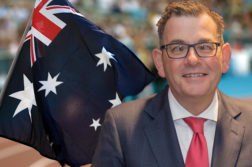Senator Nick Minchin, climate and tobacco sceptic extraordinaire, doyen of the crypto-conservative HR Nicholls Society and Lyons Forum and all round hate-object for the left, bowed out of the Senate this year. Although the circumstances of his retirement were unhappy, the burning question of who is to fill his position as Senate Antichrist remains.
David Fawcett, the new Liberal Senator for South Australia, has the dubious honour of not only sharing most of Minchin’s bugbears, but also owing his position to membership of Minchin’s SA Right faction. The similarities read like a shopping list — conservative Christian politics, ideology masked as scientific scepticism, welfare obsession — and although other production-line conservative Liberals like Michaelia Cash and Sophie Mirabella have sprung up like weeds, Fawcett may, given time, blossom into the worthy successor to Minchin’s legacy.
He’s also got experience compared to many of our new senators.
After a career in the ADF, including a stint as an experimental test pilot, Fawcett was elected as the federal MP for Wakefield in 2004, a division to the north of Adelaide. He’d probably still be there too, if the neighbouring division of Bonython hadn’t been dissolved, rolling suburban Labor voters into what had traditionally been a rural Liberal electorate. Fawcett lost office in 2007, and Nick Champion established Labor’s dominance over the seat last year with 62 per cent of the vote.
Three notable episodes from Fawcett’s lower house career help contextualise him as a new up-and-comer in the Libs’ conservative Right.
First, Fawcett was a champion of the Family Law Amendment (Shared Parental Responsibility) Act 2006, a controversial Howard-era reform motivated by pressure from fathers’ groups. The amendment was slammed after its introduction for ambiguity, having created the impression fathers were entitled to equal time, instead of just equal responsibility for welfare.
The Chisholm Report (pdf) also noted that the amendment made it harder for women to raise issues of family violence with the introduction of a "friendly parent" provision — a party claiming violence ran the risk of being labelled "unfriendly" and suffering limitations on parental access accordingly.
The amendment was simultaneously anti-female and pro-shared parenting. Once then-attorney general Philip Ruddock had ushered the act through the Senate, Fawcett was appointed chair of the committee to assess the role of the new Family Relationship Centres. He was dogged by allegations that the facilities would be used to porkbarrel in marginal Liberal seats.
Similarly, when parliament undertook conscience votes on RU486 and therapeutic cloning, it’s not hard to guess where Fawcett stood. Slow on the uptake? Here’s a hint: he received a "William Wilberforce" Award from the Australian Christian Values Institute for "voting for life".
In peculiarly Minchin-esque style however, he played the sceptic rather than God card, arguing against therapeutic cloning on the basis that one paper referenced in the Lockhart report by a "Korean researcher, Professor Hwang … has been subsequently exposed as fraudulent". This despite the overwhelmingly credible scientific opinion from others (pdf) that a "progressive view" be taken on the Committee’s "measured suggestions".
This is the favoured tactic of the Lyons Institute right: advancing a religious agenda without the use of the religious rhetoric that is toxic to mainstream voters. We’ll probably never know if Fawcett is an acolyte unless someone misplaces the society’s membership roll, written as it is on human skin with goats’ blood. There are strong grounds for viewing him as a fellow traveller.
Fawcett’s other main distinguishing lower house moment was his engagement with the "Peachey Belt" — a low income, high unemployment zone across several suburbs in Playford Council on the outskirts of Adelaide. In September 2007 Fawcett triumphed in his community work with Anglicare and the local council, resulting in unemployment falling "from over 24 per cent to over 18 per cent", and a $1.9 million windfall for Anglicare in the local community.
2007 being a year of record national unemployment aside, the "hand-up" rather than "hand-out" rhetoric doesn’t match with the reality of the program. It was actually a trial for quarantining welfare payments and social security income, modeled after the NT intervention. Max Davids, a local businessman held up by Fawcett as a paragon, said local people needed to be "triaged", they were engaged in "counter-cultures" and that residents being shoehorned onto the scheme needn’t worry about civil liberties, because poverty had already taken those from them.
Never mind that the Peachey Belt identifies its "counter-cultural" status as a community strength.
By the way, Playford, only 30 kilometres from Adelaide and a short drive to the picturesque Barossa Valley, has also been a site of increasing gentrification in the form of snazzy new housing developments. Quarantine those poor people and bring in the prefabs!
It could have been Minchin — if only he had been an MP instead of a senator. Instead, the dark lord of the golden abacus got to pursue his own bizarre agenda; voluntary voting mixed with monarchy, hot air on both cigarettes and the climate, undercover God-bothering. Now that Fawcett has migrated to the upper house and lacks a constituency to hold him accountable, we might see the same transformation. For progressives with an excess of bile on the stomach, we can only hope.
Like this article? Register as a New Matilda user here. It’s free! We’ll send you a bi-weekly email keeping you up to date with new stories on the site. And you can like New Matilda on Facebook here.
Want more independent media? New Matilda stays online thanks to reader donations. To become a financial supporter of NM, click here.
Donate To New Matilda
New Matilda is a small, independent media outlet. We survive through reader contributions, and never losing a lawsuit. If you got something from this article, giving something back helps us to continue speaking truth to power. Every little bit counts.



